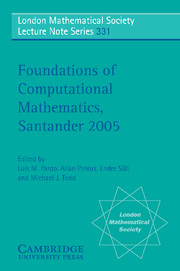Book contents
- Frontmatter
- Contents
- Preface
- 1 Non Universal Polynomial Equation Solving
- 2 Toward Accurate Polynomial Evaluation in Rounded Arithmetic
- 3 Sparse Grids for Higher Dimensional Problems
- 4 Long-time Energy Conservation
- 5 Dispersive Properties of Numerical Schemes for NSE
- 6 Eigenvalues and Nonsmooth Optimization
- 7 Discrete Noether Theorems
- 8 Hyperbolic 3-Manifolds and Their Computational Aspect
- 9 Smoothed Analysis of Algorithms and Heuristics
- 10 High-dimensional Transport-dominated Diffusion Problems
- 11 Greedy Approximations
11 - Greedy Approximations
Published online by Cambridge University Press: 13 May 2010
- Frontmatter
- Contents
- Preface
- 1 Non Universal Polynomial Equation Solving
- 2 Toward Accurate Polynomial Evaluation in Rounded Arithmetic
- 3 Sparse Grids for Higher Dimensional Problems
- 4 Long-time Energy Conservation
- 5 Dispersive Properties of Numerical Schemes for NSE
- 6 Eigenvalues and Nonsmooth Optimization
- 7 Discrete Noether Theorems
- 8 Hyperbolic 3-Manifolds and Their Computational Aspect
- 9 Smoothed Analysis of Algorithms and Heuristics
- 10 High-dimensional Transport-dominated Diffusion Problems
- 11 Greedy Approximations
Summary
Abstract
In nonlinear approximation we seek ways to approximate complicated functions by simpler functions using methods that depend nonlinearly on the function being approximated. Recently, a particular kind of nonlinear approximation, namely greedy approximation has attracted a lot of attention in both theoretical and applied settings. Greedy type algorithms have proven to be very useful in various applications such as image compression, signal processing, design of neural networks, and the numerical solution of nonlinear partial differential equations. A theory of greedy approximation is now emerging. Some fundamental convergence results have already been established and many fundamental problems remain unsolved. In this survey we place emphasis on the study of the efficiency of greedy algorithms with regards to redundant systems (dictionaries). Redundancy, on the one hand, offers much promise for greater efficiency in terms of the rate of approximation. On the other hand, it gives rise to highly nontrivial theoretical and practical problems. We note that there is solid justification for the importance of redundant systems in both theoretical questions and practical applications. This survey is a continuation of the survey Temlyakov (2003a) on nonlinear approximations. Here we concentrate on more recent results on greedy approximation.
Introduction
In the last decade we have seen successes in the study of nonlinear approximation (see the surveys DeVore (1998) and Temlyakov (2003a)). This study was motivated by numerous applications. Nonlinear approximation is important in applications because of its efficiency.
- Type
- Chapter
- Information
- Foundations of Computational Mathematics, Santander 2005 , pp. 371 - 394Publisher: Cambridge University PressPrint publication year: 2006
- 6
- Cited by

